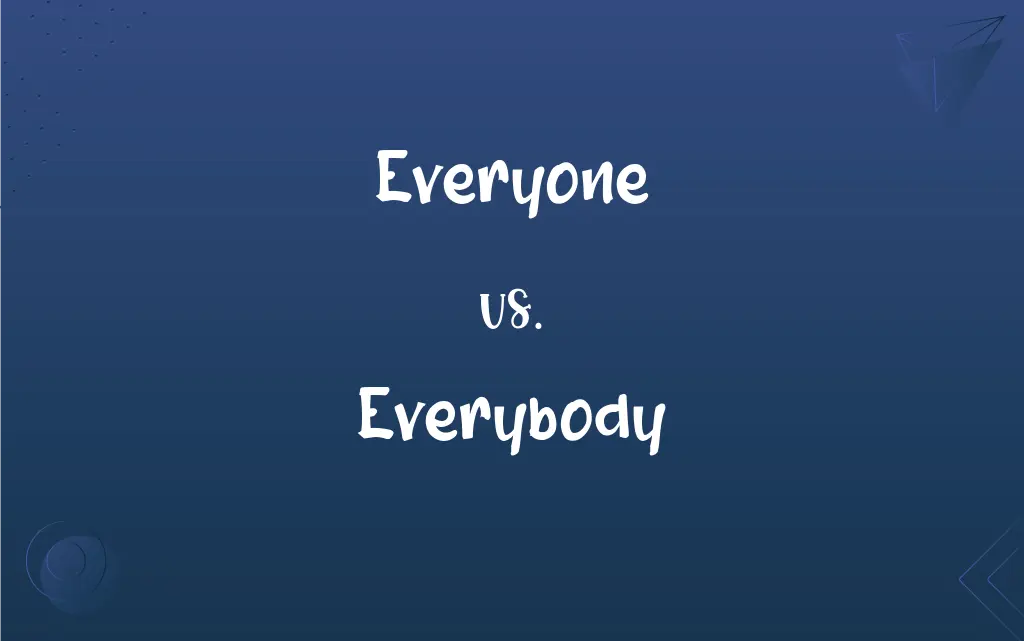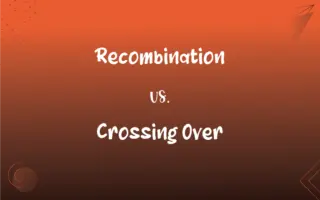Everyone vs. Everybody: What's the Difference?
Edited by Aimie Carlson || By Harlon Moss || Updated on October 17, 2023
"Everyone" and "everybody" are both pronouns that refer to all the people in a group. They are generally used interchangeably with no significant difference in meaning.

Key Differences
"Everyone" and "everybody" are synonymous pronouns in the English language, and both mean "all the people" or "every person." They are utilized to refer to a group of people without specifying who exactly is being talked about. For example, "Everyone is invited to the party" means that no one is excluded from the invitation.
The choice between using "everyone" and "everybody" largely depends on a speaker's or writer's preference. In most contexts, the two words can be swapped without altering the sentence's meaning. For instance, "Everybody loves a good movie" conveys the same sentiment as "Everyone loves a good movie."
However, there may be subtle differences in how they are perceived. Some argue that "everyone" sounds slightly more formal than "everybody," though this distinction is minor and not universally acknowledged. You might, for instance, see "everyone" used more often in written language, while "everybody" could be more prevalent in casual speech.
It's worth noting that despite their meanings, both "everyone" and "everybody" are singular pronouns and are typically paired with singular verbs. For instance, we say, "Everyone is here," not "Everyone are here." This grammatical rule holds true for both words, emphasizing their synonymous nature.
Comparison Chart
Meaning
All the people in a group.
All the people in a group.
ADVERTISEMENT
Usage in Sentences
Slightly more formal.
Slightly more informal.
Grammatical Number
Singular
Singular
Typical Pairing
Paired with singular verbs.
Paired with singular verbs.
Contextual Preference
More common in written language.
More common in spoken language.
Everyone and Everybody Definitions
Everyone
Every person without exception.
Everyone was excited about the upcoming event.
ADVERTISEMENT
Everybody
Each person.
Everybody has a unique story to tell.
Everyone
Each and every person.
Everyone needs to submit their forms by Friday.
Everybody
All members of a particular group.
The news surprised everybody in the room.
Everyone
All individuals in a certain group.
She greeted everyone at the door.
Everybody
Every individual person.
Everybody needs some rest once in a while.
Everyone
The entirety of people concerned.
Everyone in the team contributed to the success.
Everybody
All those present or involved.
Everybody cheered when the goal was scored.
Everyone
All those being addressed or considered.
Is everyone ready to leave?
Everybody
The whole number of people.
The concert was so popular that everybody was talking about it.
Everyone
Every person.
Everybody
All people.
Everyone
Everybody; - commonly separated, every one.
Everybody
Every person.
FAQs
Are they singular or plural pronouns?
Both "everyone" and "everybody" are singular pronouns.
Which one is more commonly used in writing?
"Everyone" might be slightly more common in written language.
Are "everyone" and "everybody" interchangeable?
Yes, in most contexts they can be used interchangeably without changing the meaning.
Can I use a plural verb with "everyone"?
No, "everyone" and "everybody" typically pair with singular verbs.
How about in speech?
"Everybody" might be more prevalent in casual speech.
Do they both mean the same thing?
Yes, both refer to all the people in a group.
Can I use them to refer to a specific group?
Yes, e.g., "Everyone in the class passed the test."
Are they used differently in American and British English?
Both terms are used similarly in both dialects.
Can they be used in formal writing?
Yes, both can be used, though "everyone" might be slightly preferred.
What if I'm unsure about which to use?
Choose based on personal preference; the meaning will remain the same.
Are they ever used to refer to non-human things?
Typically, they are used to refer to people, not objects or animals.
Are there any contexts where one should be preferred over the other?
Generally, no, but based on nuances of formality, one might be chosen over the other.
How do I decide which one to use?
It's largely based on personal preference and context.
Are there any exceptions to their interchangeable use?
In most standard situations, they are interchangeable without any change in meaning.
Is there a major difference between the two?
Not in meaning, but some feel "everyone" is slightly more formal than "everybody."
How do I know if my usage is correct?
Ensure it's paired with a singular verb and the context makes sense.
Can I say "Everyone are ready"?
No, the correct usage is "Everyone is ready."
Is "everybody" more colloquial than "everyone"?
Some consider "everybody" slightly more colloquial, but the difference is subtle.
Are there any idioms or phrases that use one but not the other?
Most idioms or phrases can use either, e.g., "Everyone/everybody has their day."
Can they be used to refer to people of all ages?
Yes, both can refer to people of any age.
About Author
Written by
Harlon MossHarlon is a seasoned quality moderator and accomplished content writer for Difference Wiki. An alumnus of the prestigious University of California, he earned his degree in Computer Science. Leveraging his academic background, Harlon brings a meticulous and informed perspective to his work, ensuring content accuracy and excellence.
Edited by
Aimie CarlsonAimie Carlson, holding a master's degree in English literature, is a fervent English language enthusiast. She lends her writing talents to Difference Wiki, a prominent website that specializes in comparisons, offering readers insightful analyses that both captivate and inform.































































